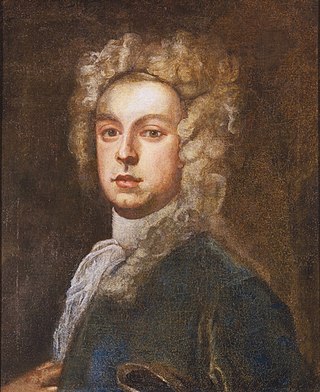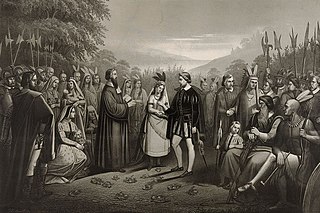Related Research Articles
Augustine Washington Jr. was an American planter, military officer and politician best known for being the half-brother of George Washington.

Benjamin Waller was an American planter, lawyer, politician, military officer and judge.
William Stith was an early American historian and an Anglican minister. He was the third president of the College of William & Mary (1752–1755), where Stith Hall was named for him.
William Dawson (1704–1752) was an Anglican clergyman, poet and member of the Governor's Council of Virginia who became the second president of The College of William & Mary in Williamsburg, Virginia (1743-1752).

Col. John Dandridge of Chestnut Grove was a colonel, planter, politician, and Clerk of New Kent County, Virginia from 1730 to 1756. He may be best known as the father of Bartholomew Dandridge and the first First Lady of the United States Martha Dandridge Washington. His grandson John Dandridge also served in the Virginia General Assembly.
Richard Bland I, sometimes known as Richard Bland of Jordan's Point, was a Virginia planter and member of the Virginia House of Burgesses, and the father of Founding Father Richard Bland.
John George (1603–1679) was an early Virginia colonist, landowner, soldier, county court justice and legislative representative (politician). He served at least two terms as a burgess in the Virginia House of Burgesses in the 1640s and 1650s representing Isle of Wight County, Virginia.
George Fawdon, also spelled in various sources as George Fawden, George Fawder, George Fadoin, George Faudon, George Fawdoune, George Faudown, George Fawdowne, and George Fowden, was an early Virginia colonist, landowner, militia officer, county court clerk, county clerk justice and legislative representative (politician). He served at least two terms as a burgess in the Virginia House of Burgesses in the 1640s and 1650s representing Isle of Wight County, Virginia.
Hancock Custis was a member of the Virginia House of Burgesses, the elected lower house of the colonial Virginia General Assembly from Accomack County, Virginia in 1710–1712.
Thomas Wotton (1582-1669) was a surgeon who traveled to Jamestown, Virginia in 1607 with the original group of colonists. Another surgeon, Will Wilkinson, also was among the first colonists. Wotton was described as a "gentleman" while Wilkinson was identified with the laborers and craftsmen.
Robert Abrahall was the first member of the Virginia House of Burgesses, the elected lower house of the colonial Virginia General Assembly, from New Kent County, Virginia, in 1654. He again served in the House in 1659–1660. He may have served in 1654–1657 since the lists of members for those years are incomplete and no members for New Kent County are shown.

Reverend Richard Buck was a minister to the Colony of Virginia at Jamestown, Virginia from 1610 to 1624. He was chaplain of the first session of the Virginia General Assembly, which was composed of the House of Burgesses and the Virginia Governor's Council. This assembly met in the church at Jamestown on July 30, 1619, as the first elected assembly and law making body in colonial America.
Abraham Iverson, shown in some records, including land patents, as Abraham Iveson was a member of the Virginia House of Burgesses, the elected lower house of the colonial Virginia General Assembly, from Gloucester County, in 1653.
Thomas Haynes was a member of the Virginia House of Burgesses, the elected lower house of the colonial Virginia General Assembly, from Warwick County, from 1736 to 1740.

Henry Herrick, sometimes spelled Henry Hayrick or Henry Heyrick or Henry Heyricke was a member of the Virginia House of Burgesses, the elected lower house of the colonial Virginia General Assembly, from Warwick County, in 1644 and 1644–1645.
Thomas Herrick, sometimes spelled Thomas Hayrick or Thomas Heyrick or Thomas Heyricke was a member of the Virginia House of Burgesses, the elected lower house of the colonial Virginia General Assembly, from the "Upper Part of" Elizabeth City, Virginia, later Elizabeth City County, Virginia, now Hampton, Virginia, in 1629–1630.
Robert Beasley was a member of the Virginia House of Burgesses, the elected lower house of the colonial Virginia General Assembly, from Isle of Wight County, in 1655 and 1656.
Robert Savin was a member of the Virginia House of Burgesses, the elected lower house of the colonial Virginia General Assembly, from "Warrosquoyacke County," later Isle of Wight County, in the assemblies of 1629 and 1629–1630.
William Sharpe was an early Virginia colonist, soldier, ancient planter, and Virginia Company shareholder who settled in the Bermuda Hundred area that became part of Charles City County, Virginia. He served in the Virginia House of Burgesses in Jamestown, Virginia, in 1629.
James Bray Jr. was a merchant, planter, and politician in the Colony of Virginia, who once represented James City County in the House of Burgesses.
References
- 1 2 Tyler, Lyon Gardiner, ed. Encyclopedia of Virginia Biography. Volume 1. New York: Lewis Historical Publishing Company, 1915. OCLC 2576742. Retrieved July 15, 2011. p. 252. Source for burgess service.